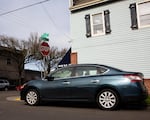For most drivers in Portland, the absence of a yellow curb or city parking sign is usually interpreted as a good place to park their cars.
But a new $5.9 million lawsuit claims Portland is knowingly ignoring Oregon law by allowing drivers to park too close to crosswalks and intersections, blocking the view of oncoming pedestrians and traffic.
BikePortland first reported that Portland attorney and transportation activist Scott Kocher filed the lawsuit against the city on Tuesday. In the filing, Kocher alleges the city's negligence caused the death of Elijah Coe, a motorcyclist who was fatally struck by a driver in May 2019.
“Eric Whitfield, who was driving northbound on SE 17th Avenue, stopped at the stop sign, and attempted to turn left (westbound) onto Burnside,” the lawsuit reads.
“People had parked vehicles along the curb as the City’s signage invited them to do, blocking Mr. Coe and Mr. Whitfield’s view of each other.”
According to the suit, Coe was able to swerve out of Whitfield’s way, but was unable to get back into his eastbound lane before colliding with another vehicle. Coe died five days after the crash.
Kocher is suing the city and Whitfield on behalf of Coe’s family seeking $5.9 million in damages, requiring the city to provide parking setbacks at all corners in the city where it’s required for safety in accordance with city code and state law.
According to Oregon law, cars are prohibited from parking within 20 feet of a crosswalk, marked or unmarked. The suit argues that the Portland Bureau of Transportation fails to enforce this law and to provide adequate sight distance at intersections, endangering people regardless of their mode of transportation.

A car sits parked next to a crosswalk in Southeast Portland, Ore., Saturday, Feb. 22, 2020. A $5.9 million lawsuit claims Portland knowingly ignores Oregon law by allowing drivers to park too close to crosswalks and intersections.
Bradley W. Parks / OPB
Kocher claims Coe’s death could have been prevented if the city complied with the law.
“We need to up our game a lot, there’s no question,” Kocher said. “We have to change how we think about streets and driving — we have to make Portland a livable, walkable place for everybody.”
PBOT adopted its street safety action plan Vision Zero in 2016, in an effort to end all traffic fatalities in Portland by 2025.
But Coe was one of 49 people killed in 2019, the deadliest year for traffic fatalities on Portland streets since 1997.
“That’s the same year that Oslo, Norway, had one person killed, and they’re a similar-sized city,” Kocher said. “So we know it can be done — it’s just a question of political will, and people realizing that it’s not acceptable to have people dying on our streets and being catastrophically injured.”
Kocher cited a report from Willamette Week last year, where PBOT spokesperson John Brady claimed the lack of yellow curbs and parking setbacks was due to previous Portland leadership. Kocher questions the rationale behind that current standard.
“Why are we still doing it that way? What rules is he talking about? Because the rules I’ve found say [PBOT] can’t do it that way,” Kocher said.
Oregon law also gives individual cities “road authority,” letting parking officers enforce rules at their discretion on roadways.
Dylan Rivera, a spokesperson with PBOT, declined to comment on the pending litigation.
